- Home
- Jane Peart
The Pattern Page 8
The Pattern Read online
Page 8
Honey looked doubtful. “Well, of course, I’m sure Jo will be happy to introduce Johanna and perhaps even give a party or two for her while we’re there, but I’ve never seen parental interference do more than intensify a romance, sometimes even making it the reason to flourish.”
“Be that as it may, Honey, it’s a risk I shall have to take. You know how impulsive Johanna is, and I just cannot take the chance of her rushing headlong into something as disastrous as this match could be.”
Johanna had heard her mother leave and knew she would be gone several hours for the weekly quilting session. She could not remember at which auntie’s house it was being held this week. It didn’t matter. She knew that sooner or later her situation would be circulated on the family grapevine. Johanna expected this, anticipated it, both dreading and looking forward to the opinions they would express. All would be different, she was sure. She wasn’t counting on allies because, despite their contrasting views, the cousins usually stood together on such things. All she could hope for was some understanding.
The house was empty. Now that the holidays were over, her sisters had started back to the dame school they attended in town, and she was alone.
It had been a horrible week. She had stubbornly refused to join the family for meals since the terrible scene with her parents two nights before. Johanna was not proud of the chaos she had brought into the usual harmonious atmosphere of the Shelby home. But they were being so unreasonable. They were refusing to even allow Ross to come and talk to them, ignoring all his fine qualities in an unyielding assertion that he was “unsuitable.”
Her parents were giving her a studied silent treatment, maintaining a rare period of unity about the issue. That her father was as adamant as her mother was a bitter pill to swallow. Always before, he had been willing to let Johanna present her case, whatever it was. It especially hurt that this time he stuck with her mother, and her mother was entirely inflexible.
They had forced her to be deceitful, she justified, slipping out of the house on the chance that she would meet Ross as he went about making house calls in town. By some sort of unspoken agreement, they had found that the curved stone bridge near the churchyard was an easy place for their paths to cross by “happenstance.” That’s where she hurried on her way today. She felt a little uneasiness, a kind of nervous apprehension. She had not yet told him of her parents’ reaction to telling them they were in love. She knew how deeply wounding it would be to his pride to learn they did not approve of him as a prospective husband for their daughter.
At the little bridge, Johanna looked anxiously for the familiar figure she hoped to see. She had only a few minutes to wait. Soon she saw Ross, his head bent against the wind, striding toward her.
As soon as she saw his expression, she knew something was very wrong. There were circles under his deep-set eyes, as if he had not slept. He looked drawn and there was a vulnerability about him she had never noticed before. Something had happened. Had someone in her family gone to him, told him they considered his courtship unacceptable? Her father? No, not him. Her mother? One of her uncles?
Perhaps they had even gone to Dr. Murrison? She had been foolish to think they could keep their love secret—not in this family, she thought with some bitterness. Not when everyone lived in everyone else’s pockets. Her heart felt heavy and she felt almost sick. Ross’s step slowed as he approached her, almost as if he were reluctant to see her, to tell her what she felt in her heart of hearts he had come to say.
Shivering with cold and nervousness, Johanna wasted no time. She had already broken so many rules of so-called ladylike deportment as related to him, it would be better to know at once what was the matter. It was too important. She had to know.
“What is it, Ross? You look so troubled.”
“Johanna, we cannot go on meeting like this. Your parents would be angry if they knew. We must not see each other again.”
“Not see each other? What do you mean? Not ever?” How did he know about her mother and father’s disapproval? “Ross, why? Is this your idea? But you said—” She hesitated. Then she had no pride left and finished, “you said that you loved me.”
“I shouldn’t have, Johanna. It was wrong of me.”
“Wrong? How is it wrong? You did say you loved me, didn’t you? Or did I imagine it? Dream up the whole thing?” Her voice trembled, tears glistening in her eyes.
“No, of course not. I do love you, Johanna. Maybe I should never have told you, because it was wrong—”
“I don’t understand.” She shook her head.
“The fact is, Dr. Murrison himself has discouraged me from pursuing my courtship. He says I should never have spoken to you about love—or anything—without first speaking to your parents. Dr. Murrison pointed out that this was probably the first thing they hold against me. That I don’t know the proper thing to do, that I don’t have the manners or the right background for—”
“Oh, for pity’s sake, Ross, has he threatened you? Would he dismiss you?”
“No, of course not. He just pointed out the simple truth. You come from a home, a family, a life, so different from mine or what I have to offer—”
“Does love mean nothing? That we love each other—did you tell him that?”
Looking abject, Ross slowly shook his head. “No, I didn’t. Because in my heart, I know they’re right.”
“No, they’re not. They’re very, very wrong. I love you. I won’t hear any more of this.” Johanna placed her fingers on his lips to keep him from saying more.
Ross pulled them gently away from his mouth and went on speaking.
“We must be sensible, Johanna. What do I have to offer you? A doctor without a practice of my own. I’m going back this summer when my apprenticeship with Dr. Murrison is over. Back to the mountains—you don’t know what living there would be like. There’ll be hardly any money, because most of the folks I’ll be caring for don’t have any. They’ll pay in potatoes or corn or firewood, most likely. Johanna, how can a man ask his wife—a girl like you, who’s been used to so much more—”
“I don’t care about that!” she protested.
“But I do. And if I were your father, I would. Dr. Murrison’s right. He told me he worked years before he could get married. I have nothing to offer you—”
“That’s not true, Ross. You have everything to offer me. Your life, your love, your whole heart—that’s all I want, all I’ll ever want.”
She put her gloved hand on his arm. His head was turned from her, and she longed to see his face, to try to read what he was thinking in his eyes. “Look at me, Ross.” Her voice was low, urgent, sweet to his ears. He turned, took both her hands in his, brought them to his chest, looked down into her upturned face.
“Oh, Johanna. I love you, but I want to do the right thing.”
“This is the right thing,” she whispered. “Let me talk to my parents. Surely they want me to be happy.”
“I believe they want your happiness, but I also believe they don’t think I would be part of the happiness they want for you.”
“I think it was a surprise—even a shock—but when I tell them how I feel, how I really feel about you, I think they’ll understand.”
Ross did not look so sure. “I don’t want you to be alienated from your parents, Johanna—” His voice deepened with determination. “I won’t go against your parents’ wishes. I respect them too much for that.”
A shaft of wind blew Johanna’s bonnet back, her hair about her face, and she pushed it back impatiently, tucking the strands behind her ears, then straightened her bonnet.
“I’ve always been able to convince my parents when I really and truly wanted something. This time it’s the most important thing in my life.” Johanna tried to sound convincing. However, Ross’s expression, the uncertainty in his eyes, shook her confidence.
When they parted, she felt cold and a little afraid. It was beginning to get dark as she walked home. The damp, gusty wind blew wet leaves,
scattering them, plastering them on gates and fences along the way. The glow of being with Ross, the warmth of his kiss on her lips, began to fade. She shivered. She had never before felt like this. The loving closeness of her family had always protected her, sheltered her. No one could understand how miserable she was, how desolate, how totally alone she felt. There was no one to comfort her, support her. She was in this by herself. It would take all her courage to see it through, to stand fast. Even Ross doubted the wisdom of what they were doing. He was even willing to give her up—for what? For people to whom wealth, privilege, and standing in society meant more than love?
Her mother was already home when Johanna returned red-eyed from her walk, hoping she could blame it on the cold wind. She halted briefly at the door of the parlor, made some comment about the weather to her mother, then went upstairs.
Johanna seemed oddly subdued, Rebecca thought. The suspicion that she might be hiding something confirmed her own decision. She had made the wise choice, done the right thing. The sooner Johanna was out of harm’s way, the better.
In her room, Johanna paced agitatedly. She must get this over, get everything out into the open. The sooner, the better. She would wait until after supper, after both her younger sisters were in bed. Then when both parents were together, she would go to them. The only way she could hope to make her parents understand that she was serious was to tell them in clear, brave, simple language, “I love Ross Davison and intend to marry him.” Over and over she rehearsed just what she would say. But she never got to say those fiercely independent words.
Johanna worked herself up to such hope that she never imagined she could fail to convince them. She did not take into account that her parents were just as determined not to let their daughter “throw herself away” on a penniless doctor from the hills.
Chapter Eight
The following evening during dinner, the atmosphere was strained. Even the two younger girls seemed affected by the hovering storm. Finally everyone finished and as Johanna rose, preparing to do her assigned job of clearing the table, Rebecca spoke, “Leave that, Johanna. Cissy and Elly can do it tonight. Your father and I want to speak to you in the parlor.”
Johanna followed, half glad that although this was unexpected, it might be the chance she was waiting for. She drew a long breath and followed her parents across the hall.
Her mother stood at the door and closed it after Johanna entered. Rebecca moved to stand at her husband’s side, and they both turned to face her. Johanna felt a premonition—of what, she wasn’t quite sure. Then her mother spoke.
“We have been shocked and saddened by your rebellious spirit, your unfilial behavior, your unwillingness to obey us as your parents, who are wiser and far more competent to judge what is best for you. This unsuitable attachment must be ended at once. Since you do not see fit to obey us out of love and submission, we are sending you away from the occasion of your willful disregard of parental guidance until you come to your senses. Tomorrow you are leaving with Aunt Honey for an extended stay at Aunt Jo’s in Winston. We hope this will give you the opportunity to examine your recent behavior, come to your senses, and once more trust that we know what is best for you.”
Stunned, Johanna gasped. “You can’t mean that! You wouldn’t! How could you, Mama?” Her voice broke into a sob. “To send me away like this—like I’ve done something wicked! I don’t deserve to be treated like a child!”
“You are little more than a child, Johanna—a foolish, stubborn one, we have to concede. However, you are still under our supervision, and we are responsible for your actions, certainly for your future. You will do as you are told.”
“Papa, do you agree?” Johanna turned in desperation to her usual advocate. But Tennant’s face was averted. He stared into the fire and did not turn to look at Johanna. But her mother spoke, drawing Johanna’s attention back to the one who was the real originator of the idea to exile her.
“Your clothes and other things are packed, and you will leave first thing in the morning.”
Unable to speak, blinded by tears, Johanna whirled around and ran out of the room, tripping on the hem of her dress as she stumbled up the stairs to her room. She let the door slam behind her, then stood there for a moment looking wildly around as if for some escape. Then her gaze found her small, humpbacked trunk at the foot of the poster bed. The lid was raised but it was neatly packed, just awaiting a few last minute belongings to be placed in the top layer.
A sob rose and caught in Johanna’s throat. So it was true. They were sending her away. Well, if they thought that would make her forget Ross or change her mind about him—they were wrong. Johanna’s jaw clenched.
Later, coming upstairs, Rebecca paused on the landing. From behind Johanna’s closed bedroom door, she heard muffled sounds. One hand gripped the banister. Her sobs were pathetic, heartrending to hear. Consciously Rebecca stiffened, stifling her maternal urge to go in, to comfort. Then her sensible nature took over. No, Johanna needed to learn that life wasn’t simply a matter of choices. There was a reason. She could not allow her daughter to throw away her life, all she’d been groomed and trained for, on a nobody—a man from who knows what kind of family? Slowly Rebecca mounted the rest of the stairs and passed her daughter’s door without stopping.
The next morning when Aunt Honey’s coach was sent around for her, Johanna came downstairs to find her father had already left the house for his law office. Puzzled, she asked, “Didn’t Papa even wait to tell me good-bye?”
“You have hurt your father deeply,” Rebecca replied tightly.
Her words stung Johanna as much as if she had been slapped in the face. She stepped away from her mother, feeling both guilty to have caused her beloved father unhappiness and wounded by this rebuke. She knew she had behaved impulsively, spoken disrespectfully. Much she wished she could retract. She was remorseful and if he had been there, she might have begged her father’s forgiveness. But to let her leave like this seemed too cruel a punishment.
“It’s time to go, Johanna. Matthew and Honey want to get an early start, and you still have to pick up Aunt Jo.”
Her mother turned a cool cheek for Johanna to kiss, and dutifully Johanna bid her good-bye. She prayed that someday all this hurt between them would be healed. She dearly wanted this, but not if it meant giving up Ross.
The night before, she had committed one last rebellious act. She had written to Ross, planning to post it somehow on the way. In her letter, she told him of her departure, adding,
Ross, I am doing what my parents wish by going to my aunt’s without complaint, if only to prove that this imposed separation will not change my feelings toward you. In fact, I believe the old adage “Absence makes the heart grow fonder.” I trust that you feel the same as I do. I trust that when you said you loved me, you meant it and are willing to wait and hope that this forced parting will have been worth it when my parents give their consent.
After writing those lines, Johanna had put her pen aside for a moment. She knew she had laid her heart bare and it may have been reckless to do so. But Johanna knew Ross was a man to trust—his word was his bond. He had told her he loved her, and that was enough for her. Both of them knew that the feeling between them was too strong to be denied. It wasn’t as simple a matter as her parents thought. What was between her and Ross was deeper than that.
A future together seemed threatened, but Johanna felt that whatever the future held, she wanted to share it with Ross. No matter what price she had to pay. Otherwise, she foresaw for herself a life of bitter regret, a loss that nothing else would ever fill.
Now as she looked through the oval window in the back of Uncle Matthew’s carriage and saw the house she had left grow smaller and smaller as they went down the lane, Johanna’s heart was wrenched. Home, with all it implied, meant a great deal to Johanna. She had often been homesick when away at school, had longed to be back in the warm, harmonious atmosphere with her parents and sisters. But now it was almost a relief to
be going. The strain between her and her parents had become unbearable. On the other hand, leaving Hillsboro meant that even a chance encounter with Ross was impossible.
Well, she would have to make the best of it. Ross would know she had not given up, and however long her exile would be, her parents would see it had not achieved its goal. When it was over and she came back, surely they could work things out.
Aunt Jo and Aunt Honey were companionable fellow travelers, and the daylong trip was not too arduous at all. Even though Johanna was sure her aunties had been advised of the reason she was accompanying them, they did not mention a word, and the day passed pleasantly. Uncle Matthew fell asleep almost as soon as they had passed the town limits, and he slept most of the way.
The McMillan’s house was a rambling fieldstone-and-clapboard structure a little distance from town. Aunt Jo’s husband, Mac, as everyone called him, came out on the porch to greet them heartily as the carriage came to a stop in front. His warm welcome was the key to the rest of Johanna’s visit.
There was an assortment of relatives from odd branches of all the families that were merged with the Logan clans, and all of them outdid themselves to entertain the visiting cousins. Everyone contrived to make Johanna’s visit pleasant. There were parties of all kinds, dancing, skating, suppers, and teas. Aunt Jo had many friends with sons and daughters Johanna’s age. Most of the young men attended the local college and always came with two or three classmates to any sort of gathering to which they were invited. Johanna never lacked for dance partners at any of the events, even though she felt less like dancing and partying than she ever had. She missed Ross terribly. In the midst of any party, her thoughts would stray to the one person who wasn’t there, and her vivaciousness would visibly fade, her attention span falter, her conversation become distracted.

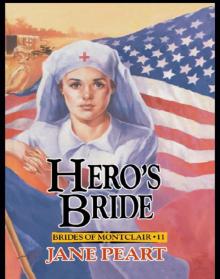 Hero's Bride
Hero's Bride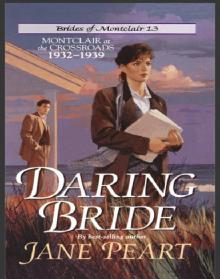 Daring Bride
Daring Bride Runaway Heart
Runaway Heart Promise of the Valley
Promise of the Valley Gallant Bride
Gallant Bride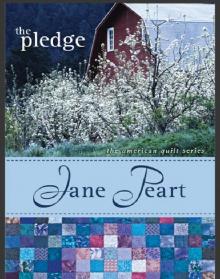 The Pledge, Value
The Pledge, Value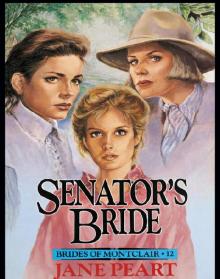 Senator's Bride
Senator's Bride Valiant Bride
Valiant Bride Shadow Bride
Shadow Bride Destiny's Bride
Destiny's Bride A Tangled Web
A Tangled Web Folly's Bride
Folly's Bride The Promise
The Promise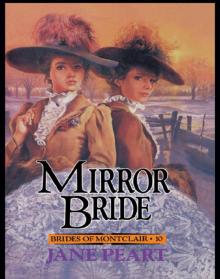 Mirror Bride
Mirror Bride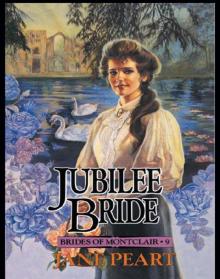 Jubilee Bride
Jubilee Bride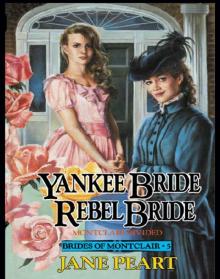 Yankee Bride / Rebel Bride
Yankee Bride / Rebel Bride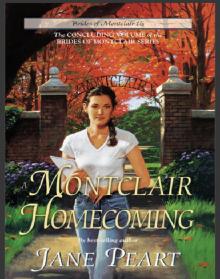 A Montclair Homecoming
A Montclair Homecoming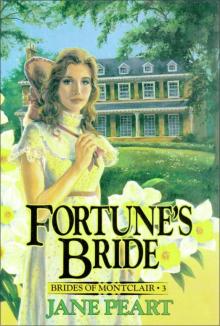 Fortune's Bride
Fortune's Bride Undaunted Spirit
Undaunted Spirit Love Takes Flight
Love Takes Flight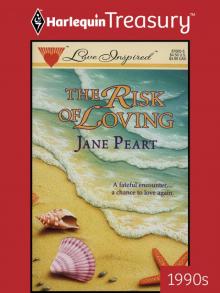 The Risk of Loving
The Risk of Loving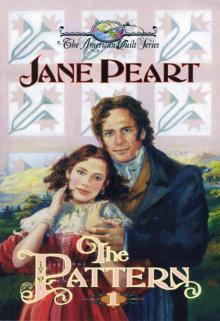 The Pattern
The Pattern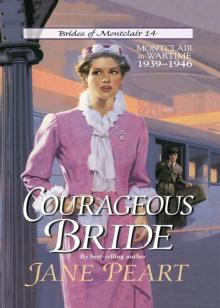 Courageous Bride
Courageous Bride